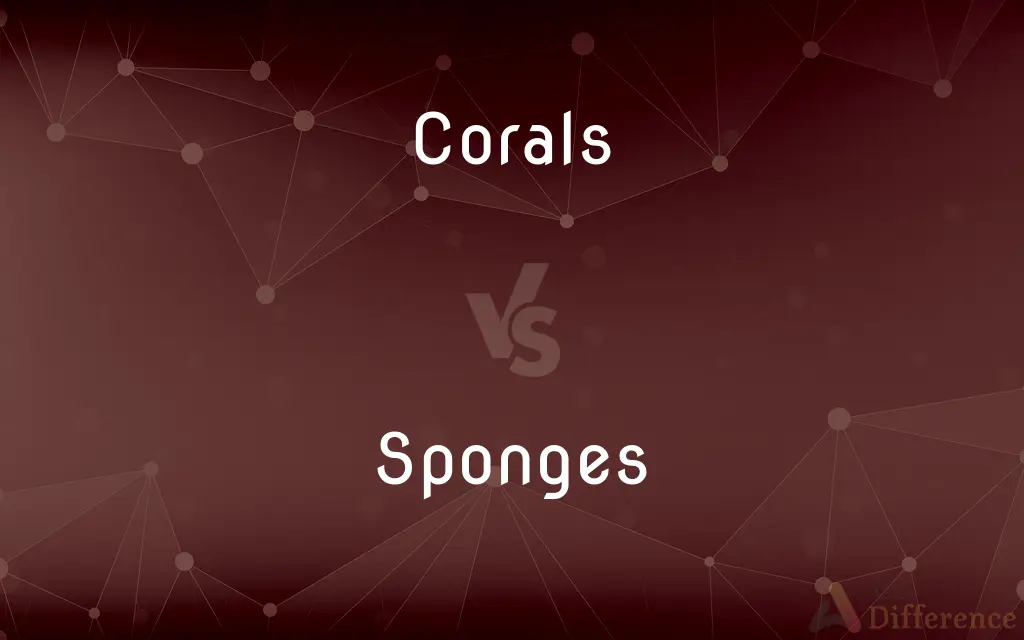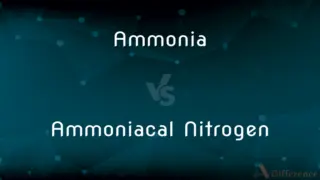Corals vs. Sponges — What's the Difference?
By Tayyaba Rehman — Published on January 1, 2024
Corals are marine invertebrates forming large, colorful colonies with a hard skeleton, while sponges are simple, porous animals that filter feed, lacking true tissues or organs.

Difference Between Corals and Sponges
Table of Contents
ADVERTISEMENT
Key Differences
Corals are marine invertebrates known for their bright colors and hard calcium carbonate skeletons, forming coral reefs. Sponges, in contrast, are simpler organisms, often lacking distinct colors and shapes, with porous bodies and no skeleton.
Corals engage in a symbiotic relationship with algae, which live in their tissues and provide them with nutrients via photosynthesis. Sponges, however, filter feed by drawing water through their porous bodies, trapping nutrients.
The structure of coral reefs is created by the accumulation of coral skeletons, which form complex habitats for diverse marine life. Sponges do not build such structures but can be found growing on various surfaces in the ocean.
Corals are more sensitive to environmental changes, like ocean acidification and temperature shifts, which can lead to coral bleaching. Sponges are generally more resilient to environmental changes but can also be affected by pollution and habitat destruction.
Comparison Chart
Physical Structure
Hard skeletons, colorful colonies
Porous bodies, no skeleton
ADVERTISEMENT
Feeding Mechanism
Symbiotic with algae, photosynthesis
Filter feeding, water filtration
Habitat Contribution
Form coral reefs, complex habitats
Do not form structures, grow on surfaces
Environmental Sensitivity
Sensitive to changes, prone to bleaching
More resilient, but affected by pollution
Compare with Definitions
Corals
Symbiotic with algae, contributing to reef ecosystems.
The corals' health is vital for the entire reef ecosystem.
Sponges
Simple, porous marine animals.
Sponges can filter enormous amounts of water daily.
Corals
Sensitive to environmental changes.
Rising temperatures are causing widespread coral bleaching.
Sponges
Filter feeders, trapping nutrients from water.
Sponges contribute to water clarity by their filtering action.
Corals
Marine invertebrates with hard skeletons.
The corals in the reef were a stunning array of colors.
Sponges
Any of numerous aquatic, chiefly marine filter-feeding invertebrate animals of the phylum Porifera, characteristically having a porous skeleton composed of fibrous material or siliceous or calcareous spicules and often forming colonies attached to an underwater surface. Also called poriferan.
Corals
Formers of large, colorful colonies.
Diving near the coral colonies was an unforgettable experience.
Sponges
A piece of the absorbent skeleton of certain of these organisms, or a piece of plastic or another material that is similar in absorbency, used for cleaning, bathing, and other purposes.
Corals
Plural of coral
Sponges
Metal in a porous, brittle form, as after the removal of other metals in processing, used as a raw material in manufacturing.
Sponges
A gauze pad used to absorb blood and other fluids, as in surgery or the dressing of a wound.
Sponges
Dough that has been or is being leavened.
Sponges
A light cake, such as sponge cake.
Sponges
(Informal) One who habitually depends on others for one's own maintenance.
Sponges
(Slang) A person who drinks large amounts of alcohol.
Sponges
To moisten, wipe, or clean with a sponge or cloth
Sponge off the table.
Sponges
To remove or absorb with a sponge or cloth
Sponge off the sweat.
Sponge up the mess.
Sponges
To apply or daub with a sponge
Sponge paint on the wall.
Sponges
(Informal) To obtain free, as by begging or freeloading
Sponge a meal.
Sponges
To harvest sponges.
Sponges
(Informal) To obtain something such as food or money by relying on the generosity of others
Sponged off her parents.
Sponges
Plural of sponge
Sponges
Infl of sponge
Sponges
Lack true tissues or organs.
Despite their simplicity, sponges play a crucial role in marine ecosystems.
Sponges
Resilient to environmental changes.
Sponges have adapted to survive in diverse marine environments.
Common Curiosities
What is the feeding mechanism of sponges?
They filter feed by drawing water through their bodies.
Do corals form reefs?
Yes, their skeletons build up to form coral reefs.
How do corals feed?
Through a symbiotic relationship with algae, using photosynthesis.
Can sponges form structures like reefs?
No, they don't form structures but grow on various surfaces.
How do sponges contribute to the marine ecosystem?
By filtering water and providing habitat for small organisms.
What are sponges?
Simple, porous marine animals that filter feed.
What are corals?
Marine invertebrates that form colorful, hard colonies.
Are corals affected by climate change?
Yes, especially by ocean acidification and temperature changes.
How resilient are sponges to environmental changes?
They are generally more resilient than corals.
What colors are typical of corals?
Corals are often brightly colored.
Can coral bleaching affect reefs?
Yes, it can lead to the decline of reef ecosystems.
Are both corals and sponges important for marine biodiversity?
Yes, both play crucial roles in maintaining healthy marine ecosystems.
Do sponges have a diverse color range?
They are usually less colorful than corals.
Share Your Discovery

Previous Comparison
DDL in DBMS vs. DML in DBMS
Next Comparison
Ammonia vs. Ammoniacal NitrogenAuthor Spotlight
Written by
Tayyaba RehmanTayyaba Rehman is a distinguished writer, currently serving as a primary contributor to askdifference.com. As a researcher in semantics and etymology, Tayyaba's passion for the complexity of languages and their distinctions has found a perfect home on the platform. Tayyaba delves into the intricacies of language, distinguishing between commonly confused words and phrases, thereby providing clarity for readers worldwide.
















































